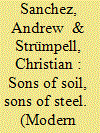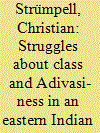|
|
|
Sort Order |
|
|
|
Items / Page
|
|
|
|
|
|
|
| Srl | Item |
| 1 |
ID:
141076


|
|
|
|
|
| Summary/Abstract |
Inspired by E. P. Thompson's modelling of class as the contingent outcome of historical processes, this paper explores how autochthony and descent came to inform the boundaries of industrial workforces in the Indian steel towns of Jamshedpur and Rourkela. We suggest that if class is a historical object, then it relates to other forms of power and identity in ways that question the use of rigid analytic typologies. In the private sector Tata company town of Jamshedpur, an industrial working class was constructed during the late colonial period from labour migrants, whose employment became heritable within families. In the public sector Rourkela Steel Plant, founded in the mid-twentieth century, the politics of ethno regionalism coincided with state development policy to inform employment reservation for autochthons. Through a historical analysis of urbanization, migration and employment policy, we consider how elite workforces that bound themselves according to the principles of autochthony and descent were formed in the social laboratories of India's steel towns. We suggest that such processes demand a class concept that engages more subtly with the work of E. P. Thompson.
|
|
|
|
|
|
|
|
|
|
|
|
|
|
|
|
| 2 |
ID:
187290


|
|
|
|
|
| Summary/Abstract |
In the eastern Indian steel town of Rourkela, Adivasis are widely stereotyped as uneducated, jangli (‘wild’), and drinkers, and they are therefore held to make for a special type of worker. Their Adivasi ‘nature’ makes them an ideal fit for facing the heat, dust, and fumes in the so-called ‘hot shops’ of the local public-sector steel plant. It is also said that Adivasis are, in fact, not well suited for the permanent and well-paid jobs the public-sector steel plant provides, and that they are better employed as contract workers who are paid little and by the day, and on whom the industry has increasingly relied since the 1970s. Critically engaging with Bourgois’ concept of ‘conjugated oppression’, I will show how these casteist stereotypes entrench the class position of Adivasis in the local steel industry, but also how this position has nevertheless changed over time—for some for the better, for many for the worse. Furthermore, although this polarization is driven by larger political economic changes it is exacerbated by the ways in which the better-off among the stereotyped Adivasi workers respond to them. This calls, I argue, for close attention to be given to the historical dynamics in the relations between class and caste (or ‘tribe’) and in the struggles related to them.
|
|
|
|
|
|
|
|
|
|
|
|
|
|
|
|
|
|
|
|
|